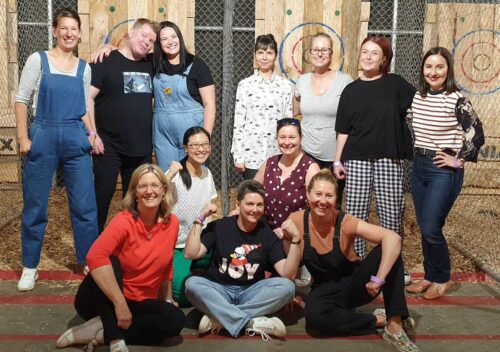
Welcome to the December edition of the ISCRR newsletter.

I am proud of the achievements of the ISCRR team this year, once again banding together and overcoming the challenges faced by the current pandemic.
In April, we celebrated our 13th anniversary. We reflected on our past achievements, but also looked towards the future with the development of the 2022 – 27 strategic plan. This plan is focused on research excellence, impact through knowledge transfer, thought leadership and sustainability. As part of this new strategy we redefined our core vision and mission. Our vision remains true to our 13-year history – to improve the health and wellbeing of the Australian working population through research and applied evidence. We achieve this through our mission – using quality evidence to inform, advise and educate. Having a strong focus on injury prevention and mental wellbeing, this strategy reaches beyond the injured worker to the entire Australian working population.
It can take a mighty effort to articulate a strategy, so I would like to take this opportunity to thank the members of ISCRR’s Steering Committee, in particular WorkSafe’s Director of Research Nicola Wojcik, for their support over the past year, and towards the future and our new vision.
Over the past year we are proud to have delivered 14 projects, with 11 projects continuing into 2023. In the area of prevention, the launch of the Vicarious Trauma Prevention and Awareness toolkit was certainly a highlight, a culmination of 3 years’ work with Community and Public Sector Union, Departments of Justice and Community Services (DJCS) and Family, Fairness and Housing (DFFH). The leading indicator questionnaire co-designed by Monash University, Healthy Working Lives Research Group and Roy Morgan was also a significant milestone in the preventive strategy area.
Further work was completed in evaluating treatment options for injured workers including lumbar spinal fusion surgery, medicinal cannabis and assistance dogs. Transition support for injured workers was also evaluated, highlighting that more tailored and guided support is needed to improve injured worker outcomes.
We worked diligently presenting our results in different ways, including 22 presentations to stakeholders and at key conferences.
The demand for our Program Logic workshops continued to grow this year, with ISCRR facilitating nine workshops. The feedback was overwhelmingly positive, with Program Logic workshops continuing on in earnest in 2023.
The ISCRR Learning series was launched in December 2021 and continued in 2022 with great momentum. ISCRR hosted nine webinars covering topics such as Program Logic, Social Prescribing, Vicarious Trauma and Research Impact. The feedback for each session was encouraging, with attendance increasing steadily through the year. The webinar series will be continuing on in 2023.
In the area of research impact, ISCRR’s research impact framework was a featured case study by Institute of Work & Health (Canada), one example of ISCRR’s increasing engagement in the area.
Partner satisfaction continued to be high for 2022, with 89% of respondents satisfied with the experience using ISCRR research. 89% also used ISCRR research in their work, discussions or planning, reinforcing the relevance of ISCRR’s research. This is a strong focus for the ISCRR team, to ensure our research is fit for purpose and can be swiftly applied to decision making.
Finally, I wish to announce that in February 2023 I will be moving on from my position as ISCRR Director. I feel lucky to have been part of ISCRR’s journey for the last 13 years, including 4 years as Director.
I am proud of the work that we have accomplished, which has led to the evolution of ISCRR to the Institute it is today.
I am sad to leave ISCRR but excited as I move onto the next phase of my life pursuing my career passion in organisational psychology.
I wish you all a safe and happy holiday break and see you refreshed and rejuvenated in 2023.
Samantha Barker, ISCRR Director